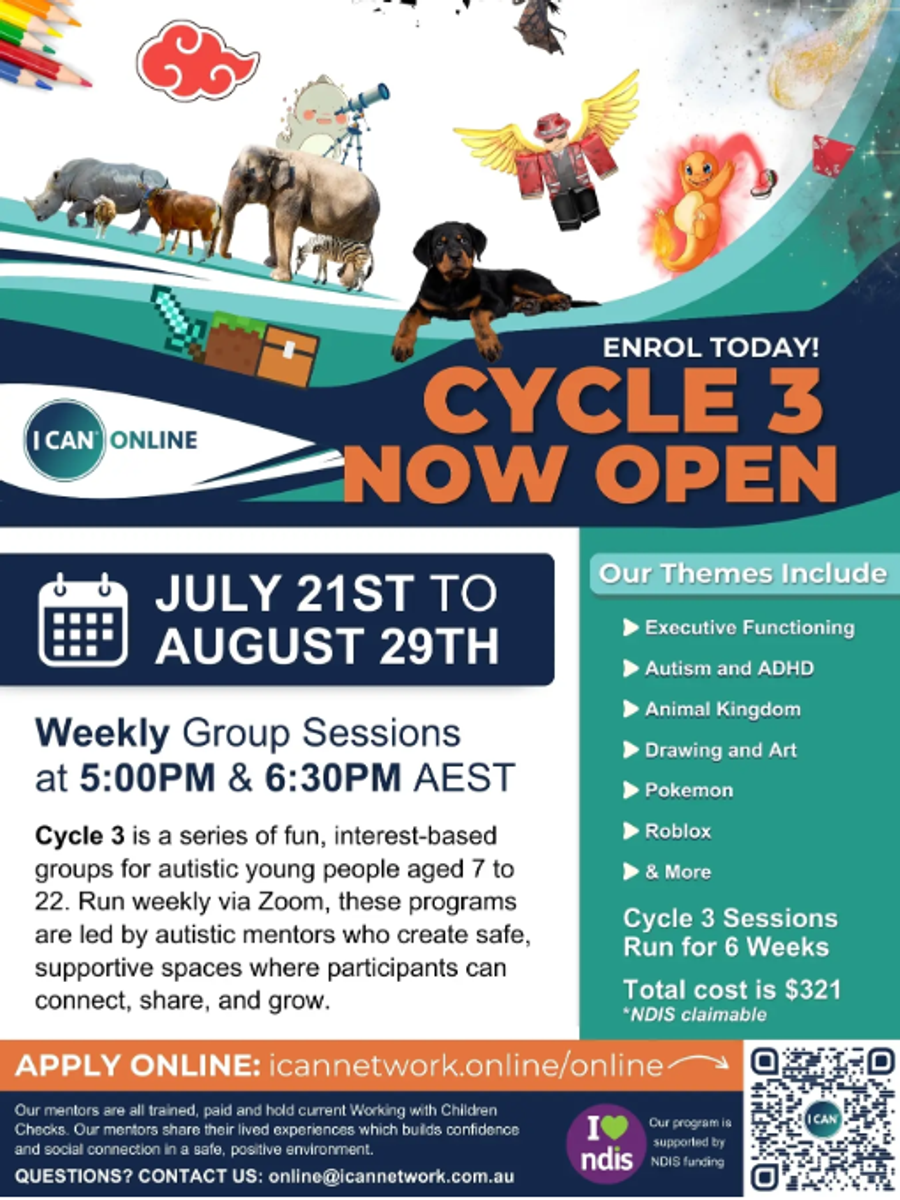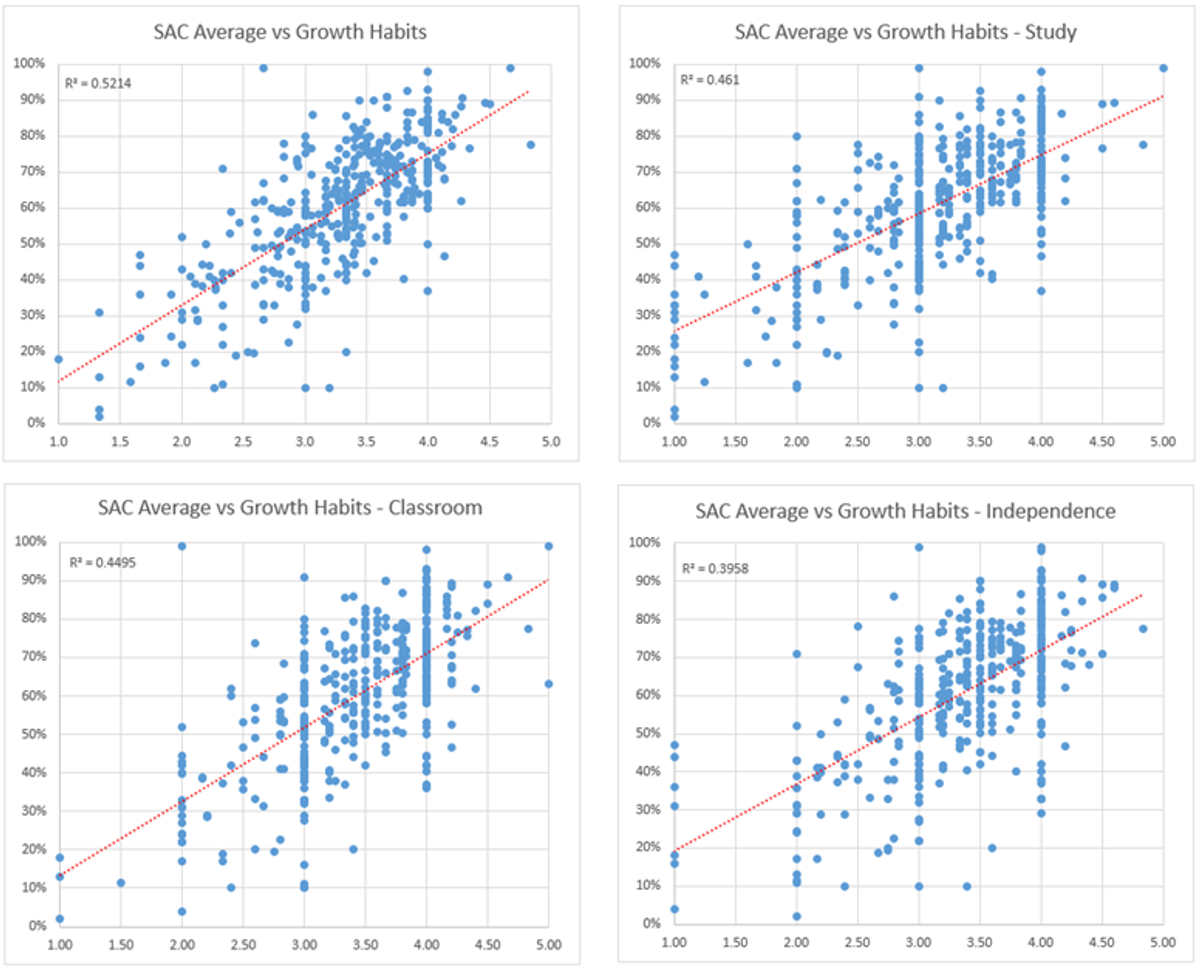Parent Support

Online support for autistic teens
I CAN Online offers Autistic-led online group mentoring programs for 7 – 22 year old Autistic people. Programs build confidence and social connection in a safe, positive environment which allows individuals to move at a pace that feels right for them. Each session offers flexibility, so attendees can engage in a way that meets their needs on the day.
Autistic young people can be themselves as they explore their interests with peers. They'll build confidence, communication and social connections along the way, whilst benefiting from I CAN Mentors as role models.
Comprising 6 x 1 hour sessions, Cycle 3 begins from Monday 21 July (beginning of Term 3). There are also school holiday program options and Minecraft session - all outside of school hours, via a zoom link from their own home. Information on pricing, interest groups offered & expressions of interest can be found at Online - I CAN®
CSEF payment for eligible families
A reminder that the closing date for CSEF (Camps, Sports and Excursions Fund) is 04 July 2025.
Your family is eligible to apply for CSEF if you hold any Centrelink concession card, including a healthcare or pension card. You must return the CSEF application form and Centrelink Card copy to the school's Reception before this date. We don’t want you to miss the 2025 CSEF payment!
You can get a copy of the form in the CSEF Forms folder on Compass via this link - School Documentation | Compass - or ask at the office.
School Saving Bonus reminder and allocation to school activities
The Victorian Government is delivering the School Saving Bonus (SSB) – a one-off support of $400 for eligible government school students from Prep to Year 12 in 2025.
The SSB can be used for uniforms and textbooks until Monday, 30 June 2025.
Any funds remaining after 30 June 2025, including online voucher amounts that have not been redeemed, will become a credit to use on school activities. However, the credit will not be available on your family account at our school until late July.
Please note, once a parent/carer has allocated money to School Activities on the SSB portal, it cannot be changed back to Uniform/Texbooks or vice-versa.
To use any remaining SSB funds to cover the cost of school activities in July, please refer to the SSB online system and allocate the funds to school activities before 30 June 2025.
To learn more about the SSB online system, download the step-by-step System guide for parents and carers (DOCX, 945KB) or watch this School Saving Bonus video. System guide translations are also available in 14 languages.
The Department of Education’s SSB contact centre will remain available until 30 June 2025. The contact centre can be reached by:
- completing the School Saving Bonus enquiry form
- calling 1800 338 663, between 8:30 am and 4:30 pm on weekdays.
After this date, please contact our administration team for any SSB related questions.
How growth habits impact VCE success
At Preston High, we remain committed to ensuring every student is supported to grow, not just through content knowledge, but also by developing the behaviours and habits that underpin that growth, no matter their starting point.
As part of this commitment, we recently conducted an in-depth analysis of how our students' engagement with our VCE Growth Habits correlates with their performance on School Assessed Coursework (SACs).
I’m pleased to share that the data strongly supports the ideas that informed the initial creation of the VCE Growth Habits: active and consistent engagement with our growth habits leads to stronger academic outcomes.
In particular, we examined four key areas of the Growth Habits rubric—Study, Classroom Engagement, Independence, and an overall combined score of the three growth habits.
Here’s what we found:
Overall Growth Habits had the strongest correlation with SAC performance (R² = 0.52), indicating that students who regularly demonstrate a mix of good study routines, engagement in class and independent learning behaviours consistently achieve better SAC results.
The individual habits also showed positive correlations:
- Study Habits (R² = 0.46): Students who organise their time well, review consistently, and prepare thoroughly tend to perform better.
- Classroom Habits (R² = 0.45): Active participation, attentiveness, and collaborative learning are strongly linked to achievement.
- Independence (R² = 0.40): While slightly lower, students who take initiative and ownership of their learning still show meaningful gains.
These results are more than just numbers—they are a powerful reminder of the importance of the behaviours we aim to cultivate through our VCE Growth Habits framework. They also serve as encouragement to our students that their day-to-day efforts in these areas truly matter.
What can you do at home?
We encourage you to:
- Discuss the Growth Habits with your child and review their self-assessment and teacher assessment (viewable on Compass Learning Tasks)
- Reinforce the value of consistent study routines and self-discipline at home. See our VCE Growth Habits rubric for specific suggested strategies:
- Celebrate not just the outcomes, but the positive habits they build along the way.
By working together - students, staff, and families - we can continue to create the conditions that allow every learner to grow.
Thank you, as always, for your partnership in supporting our students’ academic growth.
You can always learn more about Growth Habits by viewing the primer videos on our school website.
Mathew Steen
Leading Teacher – Data, Assessment and Reporting Preston High School

